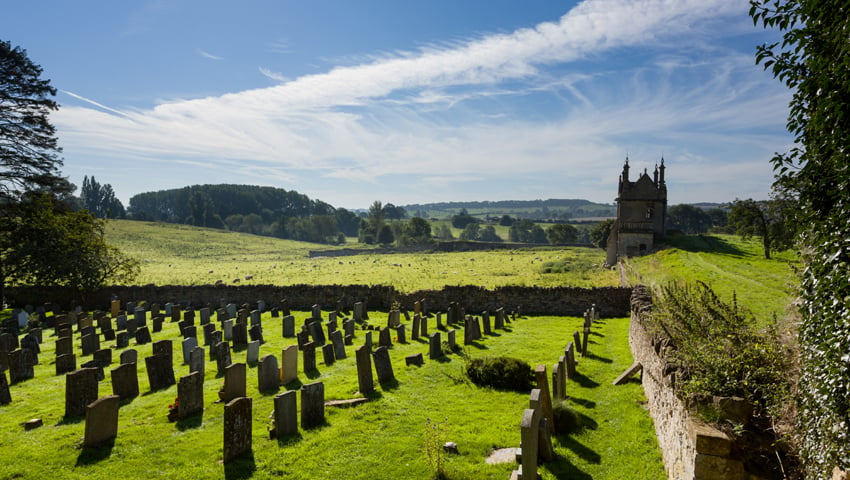Public figures have called on the Archbishop of Canterbury and the Church of England to “practise what they preach” and protect nature by committing to rewilding 30 per cent of their 105,000 acre estate by 2030.
Last Sunday, on the steps of St Paul’s Cathedral, campaigners unveiled a nine-metre long scroll which contained a collection of powerful arguments as to why the Church’s wealthy investment arm – the Church Commissioners – should rewild their extensive landholdings.
Contributions to the 95 Wild Theses (a twist on the original 95 Theses by Martin Luther that kick-started the protestant reformation) have been gathered from nearly 100 leading public figures, including former Archbishop of Canterbury Dr Rowan Williams, former Secretary of State Michael Gove, former chair of the IPBES and IPCC Sir Robert T Watson, TV presenter and conservationist Chris Packham, actor and writer Stephen Fry, chef Hugh Fearnley-Whittingstall and former Green Party leader Caroline Lucas.
Speaking at the event, organised by grassroots campaign group Wild Card, Chris Packham said, “The Archbishop of Canterbury Justin Welby and the Church’s wealthy investment arm – The Church Commissioners – are failing all things bright and beautiful. Despite the Archbishop recently stating that ‘God is green, and He calls on us to be green’, the majority of the Church Commissioners’ land is in a dire ecological condition. As one of the biggest institutional landowners in one of the world’s most nature depleted countries, the Church should be a leader in restoring our precious wildlife.
“The Archbishop and the Church Commissioners, including the Bishop of the Environment, have declined our many attempts to discuss how they can rewild their vast estate. We hope the immense support on display today, which is championed by many in the Church, will help to convince Church leaders to step up to the pulpit. If they are willing to practise what they preach they could rewild just a third of their land, which would equate to an area 90 times the size of Hyde Park, and give British wildlife the salvation that it desperately needs.”
Britain ranks in the bottom 10 per cent of nations globally for biodiversity. The Church of England’s land, which is managed as an investment by the Church Commissioners, is largely used for intensive farming, with only 3 per cent wooded, compared with the UK average of 13.1 per cent. This gives it the lowest tree coverage of the UK’s top ten institutional landowners. Whilst regenerative farming techniques have been encouraged across the estate, regenerative agriculture’s benefits for biodiversity and climate are not supported by peer-reviewed data and neither is it a substitute for nature restoration.
Wild Card previously led a successful campaign with Chris Packham that pushed for another of the country’s major land owners, the Royal Family, to rewild their land, which resulted in the launch of a series of rewilding projects on Royal estates.
At the heart of the campaign to rewild the Church are the 95 Wild Theses. This series of ecological, climatological and theological arguments, written by nearly 100 church leaders, scientists, academics, actors, politicians, musicians, theologians, lawyers, naturalists and activists will be delivered to the offices of the Church Commissioners and Lambeth Palace later today.
Dr Rowan Williams, former Archbishop of Canterbury, wrote in the 95 Wild Theses, “Letting the natural world be itself – not just a reserve bank for our convenience – is an act of grace, and one that we should be glad to embrace, because when the world around us flourishes, so do we.”
Frank Ramsey Professor Emeritus, University of Cambridge, Sir Partha Dasgupta wrote in the 95 Wild Theses, “With barely 3 per cent of England’s land adequately protected for nature, our international reputation as an environmental leader hangs in the balance. We urgently need major English landowners such as the Church Commissioners to take bold action and commit to reaching this crucial target on their own land. Without such leadership here and around the world, the UN target will surely become another hollow gesture amidst the catastrophe of the Sixth Mass Extinction.”
The Church has shown global leadership in supporting the UN climate goals by divesting from fossil fuels. In February, the Church’s democratic body The General Synod passed a motion calling for action to increase biodiversity across the Church’s various landholdings. However, it lacks concrete and measurable targets for the Church’s single largest landholding – the land owned by the Commissioners. As a signatory of the United Nations’ global treaty to restore and protect 30 per cent of land and seas for nature by 2030, the UK cannot achieve this target without action from the country’s largest landowners.
Paul Jaffe, head of sustainability, real assets for the Church Commissioners, said, “While large-scale rewilding is not appropriate for our highly productive farmland, we are deeply committed to supporting nature through a range of initiatives. We focus on sustainable farming practices, collaborate with organisations like the RSPB and FWAG, and actively integrate biodiversity projects, such as woodland creation and wetland restoration, across our portfolio. Our approach ensures we balance food production with stewardship of the land, helping to safeguard nature for future generations.”
The Commissioners said it is committed to implementing sustainable farming practices across its farmland portfolio, working with tenants and green groups to implement regenerative farming and support biodiversity.
The Commissioners also said that its 88,000-acre forest portfolio has been independently certified by the Forest Stewardship Council as adhering to strict environmental, social, and economic standards.
